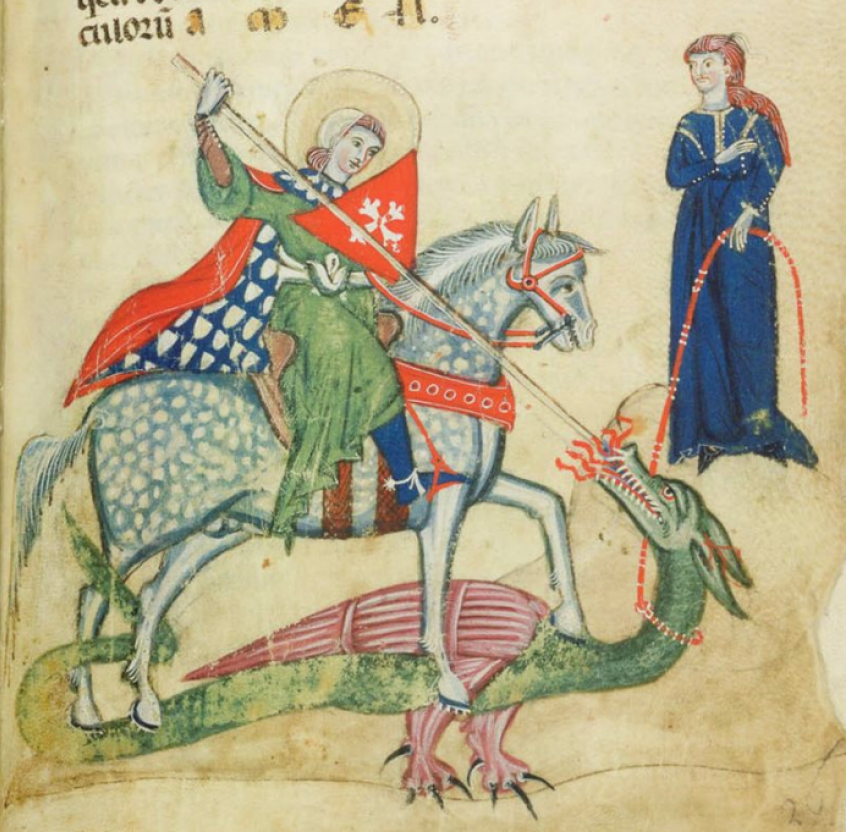It's St George's Day, when all true-born Englishmen – it's usually men – feel a patriotic glow and an upswelling of pride in being not just British, but actually English. As Cecil Rhodes remarked: 'To be born English is to win first prize in the lottery of life.'

Ah, St George – as English as roast beef and cricket.
An unusual combination of flavours. But while I hate to disillusion you, the saint was not actually English at all. He is much more likely to have been born in what is now Turkey, in Cappodocia, and was active in Syria.
We have a Turkish saint?
Not precisely; it's all a bit murky, but George was probably around in the late 2nd century AD, before the Turks came on the scene. He was probably Greek. And there's no point in getting all nationalistic about it: we have saints from all over the place.
I thought nationalism was the point of all this?
That's because of Shakespeare. He made St George the spiritual star of his blockbuster action play Henry V, the most exciting one he ever wrote. At the siege of Harfleur Henry says, 'Follow your spirit, and upon this charge/ Cry "God for Harry, England and St George!"' It's stirring stuff.
Can we go back a little? Of what possible use is St George, if he wasn't English?
We aren't going back very far, obviously. But St George was (probably) a Christian Roman soldier in the time of the Emperor Diocletian, a thoroughly nasty piece of work (he would have people executed if they made eye contact with him). George 'gave his goods to the poor, and openly confessed Christianity before the court'. He was executed after he refused to sacrifice to the pagan gods.
You say 'probably'?
He was canonised in AD 494 by Pope Gelasius, who claimed, diplomatically, that he was one of those 'whose names are justly revered among men but whose acts are known only to God'.
But he was an actual martyr?
An actual martyr. He became very popular with soldiers because he was one of them, but a fine Christian as well who wasn't afraid to die for his faith. Richard the Lionheart used to pray for his aid before his battles during the Crusades.
What about the dragon? I suppose you're going to tell me it's legendary.
As opposed to telling you that yes, there was a real dragon? Yes, it's a legend – but it is a Golden Legend. At least, it appears in a 13th-century collection of stories of that name which was very widely read. It might be linked to the Greek myth of Perseus and Andromeda, or the dragon might be the one from Revelation. Either way, George is imagined as overcoming a great spiritual evil.
I suppose he's a pretty good saint to have, if you're into saints.
Many countries have thought so. He is also the patron saint of Georgia (unsurprisingly), Ethiopia and Albania.
So not only is the patron saint of England not even English, but we have to share him? Wasn't there a properly English saint we could have had?
The way these things work, it's a bit late for that. George has been our patron saint since 1347, though before then it was Edmund, King of East Anglia, who was defeated by the Vikings and martyred in AD 870; they ordered him to renounce his faith and he refused. He was tied to a stake, shot through with arrows and beheaded; the head was reunited with the body with the help of a talking wolf.
Now that's an interesting saint.
Indeed. But on the other hand, as he was a foreigner who'd never come near to getting British citizenship today no matter how many dragons he killed, there's something poignantly topical about us having St George.
Follow Mark Woods on Twitter: @RevMarkWoods













